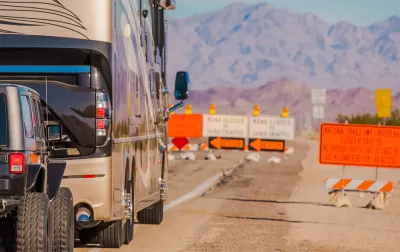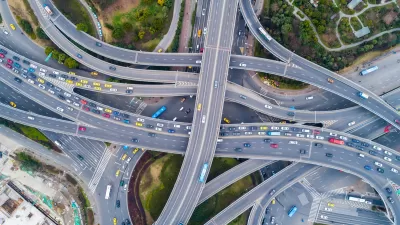Democratic legislators in Nevada are considering a constitutional amendment that would allow the state to use gas tax revenues for transportation projects other than road construction, maintenance, and repair.

According to an article by Riley Snyder, Nevada elected officials are considering a drastic change of transportation funding policy.
[B]etween desires to limit urban sprawl and address root causes of climate change, Nevada lawmakers are considering moving forward with a proposed constitutional amendment that would open up use of gas taxes and other automobile-related fees to more than just road construction and repair.
The amendment would allow gas taxes to be spent on a broader category of "transportation infrastructure. Gas tax revenues are currently limited for "construction, maintenance, and repair" of the state's public highways.
The Interim Legislative Committee on Energy has already voted to move forward with the amendment, reports Riley, although without Republican support.
The proposed constitutional change faces several political hurdles, including opposition to the idea from labor unions and construction associations, which believe that road construction and maintenance funds are already in scant supply in the state. But the discussion about transportation spending fits into larger discussions in the state about how to approach the challenges presented by climate change and population growth:
Urban transit funding and development have become increasingly prominent and pressing issues for state leaders in recent years, given expected population growth over the next decade and attempts by lawmakers and Gov. Steve Sisolak to reduce Nevada’s share of greenhouse gas emissions that contribute to climate change.
Planetizen correspondent Irvin Dawid wrote in August 2019 about Nevada's participation in the Western Road Usage Charge Consortium, which could also pave the way for a drastic change in transportation funding policy by using vehicle miles traveled as the taxing mechanism for drivers.

Rethinking Redlining
For decades we have blamed 100-year-old maps for the patterns of spatial racial inequity that persist in American cities today. An esteemed researcher says: we’ve got it all wrong.

Montreal Mall to Become 6,000 Housing Units
Place Versailles will be transformed into a mixed-use complex over the next 25 years.

Planetizen Federal Action Tracker
A weekly monitor of how Trump’s orders and actions are impacting planners and planning in America.

Connecting Communities to Nature Close to Home
Los Angeles County’s Nature in Your Neighborhood program brings free, family-friendly wellness and nature activities to local parks, making it easier for residents to enjoy and connect with the outdoors.

Palmdale’s Beloved Water Park Gets $2 Million Upgrade
To mark its 20th anniversary, DryTown Water Park has undergone major renovations, ensuring that families across the Antelope Valley continue to enjoy safe, affordable, and much-needed water-based recreation in the high desert.

Help Stop the Beetle Killing Southern California’s Oak Trees
Claifornia residents can join a volunteer “blitz” this June to help detect and map infestations of an invasive beetle that is killing thousands of oak trees across Southern California.
Urban Design for Planners 1: Software Tools
This six-course series explores essential urban design concepts using open source software and equips planners with the tools they need to participate fully in the urban design process.
Planning for Universal Design
Learn the tools for implementing Universal Design in planning regulations.
Heyer Gruel & Associates PA
City of Clovis
City of Camden Redevelopment Agency
City of Astoria
Transportation Research & Education Center (TREC) at Portland State University
Regional Transportation Commission of Southern Nevada
Toledo-Lucas County Plan Commissions





























